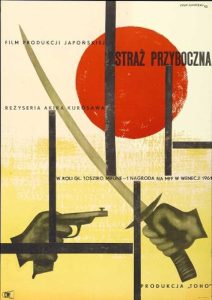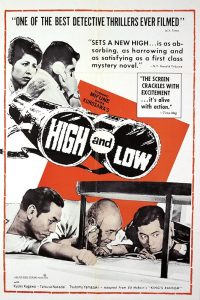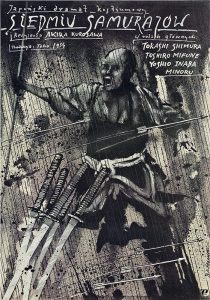Throne of Blood, a captivating drama from director Akira Kurosawa, takes us on a thrilling journey as a war-hardened general strives to fulfill a prophecy that he would become lord of Spider's Web Castle, all while being encouraged by his ambitious wife. If you're a fan of this intense and enthralling tale, we've got you covered with 15 must-watch movies that will keep you on the edge of your seat.
1) Yojimbo

Yojimbo is a classic samurai action film that will captivate you from start to finish. This movie tells the story of a crafty ronin who arrives in a town torn apart by two criminal gangs. Instead of being a passive observer, he decides to play the gangs against each other in a clever bid to free the town. Toshirô Mifune delivers a memorable performance as the ronin, creating a character that has been imitated but never equalled. You'll find yourself questioning whether his actions are truly heroic or simply the whims of a bored warrior seeking entertainment. Like many of Kurosawa's films, the motives of the characters remain open to interpretation, adding depth to the story. The film is filled with wonderful images and skillful direction that keeps the pace tight. In fact, you could watch it as a silent film and still be moved by its impact and meaning.
2) Rashomon

Rashomon. The title alone should make you curious. This movie, like Throne of Blood, is a classic from the legendary director Akira Kurosawa. Released just a few years before Throne of Blood, Rashomon was Kurosawa's first big international hit. It tells the story of the rape of a bride and the murder of her samurai husband from multiple perspectives, including those of a bandit, the bride, the samurai's ghost, and a woodcutter. The film takes place on a ferociously wet day, with a beautiful use of black and white nitrate film stock contrasting against a sordid storyline. It's a horror story, a crime scene, and a psychological exploration all rolled into one. The psychologies of the main characters are laid bare, as well as the story-tellers themselves. Like Throne of Blood, Rashomon challenges the notion of objectivity and highlights the subjectivity of human perception.
3) The Hidden Fortress

The Hidden Fortress takes us on a thrilling adventure, lured by gold, as two greedy peasants unknowingly escort a princess and her general across enemy lines. While George Lucas found inspiration for his Star Wars films in this historical epic, the comparisons are only superficial. The true genius lies in Kurosawa's storytelling and character development. The peasant farmers, with their quick shifts between cowardice, bickering, and thievery, are precursors of the Star Wars droids. However, The Hidden Fortress delves deeper into character complexity achieved through visual composition and unenhanced camera work. Kurosawa's use of the wide screen and Tohoscope reveals the true essence of the characters, particularly in the final scenes on the plains. Moreover, the film explores the code of the samurai, showcasing the honor, bravery, and devotion that define Toshiro Mifune's character.
4) The Bank

The Bank is reminiscent of Throne of Blood in its exploration of ambition and greed, albeit in a different setting. While Throne of Blood is a feudal Japanese adaptation of Macbeth, The Bank is a modern-day thriller about banking, corruption, and alchemy. Both movies delve into the darker side of human nature and the lengths people will go to achieve power and success. In Throne of Blood, a war-hardened general becomes consumed with greed and evil after receiving a prophecy about his future. In The Bank, a large corporate bank takes on a young mathematician who believes he can predict the stock market. Both films feature strong performances and captivating stories, with Anthony LaPaglia giving a standout performance in The Bank. Although The Bank may not reach the same level of depth as Throne of Blood, it is still a compelling watch that sheds light on the dark underbelly of the financial world.
5) Sanjuro

Sanjuro: This is the sequel to 'Yojimbo'. Toshirô Mifune returns as the wandering ronin Sanjûrô Tsubaki. He encounters nine naive samurai who wants to confront corruption. One of the samurai had confronted his uncle the lord with the accusations. The response was dissatisfying so he tells the superintendent. The superintendent tells the nephew to gather his men. The ronin immediately smells a trap, and the corrupt superintendent launches a raid on the group. Only the ronin's smarts saves the group. Now the uncle and his family are taken prisoner and the ronin endeavors to rescue them with the help of the nine naive samurai. Only the clueless nine are sometimes more problematic with their distrust of the often napping ronin.
Sanjuro is reminiscent of Throne of Blood, as both movies showcase a protagonist who finds himself entangled in a web of deceit and corruption.
6) The Lower Depths

The Lower Depths takes place in a Japanese slum, where various residents play out their lives, dreaming of better things or settling for their lot. In this film, Akira Kurosawa explores the moral decadence of humanity in the face of poverty. It's a dark and introspective look at how most humans are deep down, only worried about themselves and their own worldly pleasures. The inclusion of the "Old Man" gives the film an almost Buddhist insight into the situation of the slum, which helps paint its extremely intriguing - even if limited - canvas. While The Lower Depths may not rank among Kurosawa's finest films, its exploration of human nature in a poverty-stricken environment makes it a must-watch for fans of his work.
7) High and Low

High and Low takes a different approach than its predecessor, Throne of Blood, but still showcases Akira Kurosawa's talent for creating compelling and unique stories. While Throne of Blood adapted Macbeth to a feudal Japanese setting, High and Low is a hard-boiled detective tale with interconnected storylines. The film follows businessman Gondo, played by the incredible Toshiro Mifune, who becomes embroiled in a kidnapping case when his chauffeur's son is taken by mistake. Kurosawa expertly weaves together the investigation by the police, who leave no stone unturned, with Gondo's struggle to come up with the ransom money. The deliberate pacing and attention to detail make High and Low a riveting thriller. Unlike Kurosawa's samurai tales, this film keeps the violence to a minimum, making it suitable even for younger viewers. Despite the suspenseful plot, the director's compositions and framing reflect his artistic sensibilities.
8) The Stone Boy

The Stone Boy is reminiscent of Throne of Blood in several ways. Both movies fall under the drama genre and explore themes of tragedy and loss. While Throne of Blood is set in feudal Japan and tells the story of a war-hardened general driven by ambition and greed, The Stone Boy takes place in rural America and focuses on a Midwestern farm family coping with the aftermath of a tragic event. Despite their different settings and cultural contexts, both films delve into the human psyche and the emotional turmoil experienced by their characters. Additionally, both movies feature talented casts and showcase the skills of their respective directors. The Stone Boy captivates with its stunning cinematography, which captures the beauty and depth of every scene, while Throne of Blood, directed by Akira Kurosawa, masterfully combines elements of Japanese theater with Shakespearean influence. Although the two films have their unique characteristics, they both offer powerful storytelling and thought-provoking narratives that will resonate with viewers.
9) The Music Teacher

The Music Teacher takes us on a journey similar to Throne of Blood, but with a musical twist. In both films, we see the protagonists being influenced by external forces, leading them down a path of ambition and greed. While Throne of Blood is set in feudal Japan with a war-hardened general, The Music Teacher introduces us to an aging opera singer who retires and becomes a mentor to two young singers. Both movies explore the consequences of these characters' actions, as they strive to fulfill their desires. However, while Throne of Blood delves into tragedy and the dark side of human nature, The Music Teacher offers a more melodious experience with its focus on music and relationships. The film beautifully intertwines the plot with mesmerizing musical performances, creating a harmonious blend that will captivate any viewer. So, if you enjoyed the intense drama and Shakespearean influence of Throne of Blood, The Music Teacher offers a delightful variation with its melodic storytelling and unforgettable musical pieces.
10) The Idiot

The Idiot: A war-hardened general, egged on by his ambitious wife, works to fulfill a prophecy that he would become lord of Spider's Web Castle. The story may sound familiar, doesn't it? That's because The Idiot, directed by Akira Kurosawa, is reminiscent of his earlier work, Throne of Blood. While Throne of Blood is an adaptation of Shakespeare's Macbeth set in feudal Japan, The Idiot takes inspiration from Fyodor Dostoevsky's novel and brings it to post-war Japan. Both films explore themes of tragedy, ambition, and the consequences of one's actions. However, the similarities end there. Throne of Blood has a more intense and action-packed approach, while The Idiot is a slower-paced, character-driven drama. The Idiot delves into the complexities of a love triangle, with Setsuko Hara delivering a phenomenal performance as Taeko, capturing her anguish and foreboding in every scene.
11) Vendetta of a Samurai

Vendetta of a Samurai is reminiscent of Throne of Blood in its exploration of feudal Japanese society and the deconstruction of the movie samurai image. While Throne of Blood is an adaptation of Shakespeare's Macbeth, Vendetta of a Samurai takes a revisionist approach to the samurai flick genre. Both films feature Toshirô Mifune in leading roles, showcasing his histrionics and captivating screen presence. However, Vendetta of a Samurai is a slower movie, as it focuses on the journey of a young, untested samurai seeking vengeance with the help of Mifune's character and his loyal retainers. The film is a deconstruction of the movie samurai image, with the characters not measuring up to the heroic stereotypes seen in countless films. This deviation from the norm adds an interesting twist to the story. Despite its theoretical appeal, Vendetta of a Samurai falls short as a movie.
12) Seven Samurai

Seven Samurai, just like Throne of Blood, is a cinematic masterpiece directed by Akira Kurosawa. While Throne of Blood is a tragedy set in feudal Japan, Seven Samurai takes place in 16th century Japan and revolves around farmers who hire a veteran samurai for protection against bandits. The two films share Toshiro Mifune as a cast member, who delivers exceptional performances in both. However, Seven Samurai stands out as one of the most widely recognized Japanese films ever made and is often compared to Orson Welles' Citizen Kane. It is a true milestone in motion picture history, showcasing Kurosawa's brilliance as a director. The film's stunning imagery and cinematic poetry evoke a wealth of emotions that words cannot describe. If you have seen Throne of Blood and are looking for another Kurosawa masterpiece, Seven Samurai is a must-watch that will captivate you with its beauty, excellence, and magical storytelling.
13) I Live in Fear

I Live in Fear, also known as Ikimono no kiroku, is reminiscent of Throne of Blood. Both films were directed by the legendary Akira Kurosawa and showcase his unique storytelling style. While Throne of Blood is a feudal Japanese adaptation of Shakespeare's Macbeth, I Live in Fear takes a different approach. It explores the fear of nuclear war through the perspective of an aging Japanese industrialist. Despite the difference in themes, the films share some common elements. They both feature Toshirô Mifune, who delivers captivating performances in both movies. Additionally, both films delve into the darker side of human nature, showcasing characters consumed by greed or fear. However, what sets I Live in Fear apart is its subtle reworking of familiar King Lear themes. It cleverly portrays the struggles of an old man who refuses to accept his family's interference.
14) Samurai III: Duel at Ganryu Island

Samurai III: Duel at Ganryu Island is reminiscent of Throne of Blood in many ways. Just like Throne of Blood, Samurai III beautifully combines action and drama, showcasing the depth and complexity of its characters. While Throne of Blood explores the tragic downfall of a war-hardened general consumed by ambition, Samurai III delves into the spiritual growth of its protagonist, Musashi Miyamoto. Both films highlight the internal struggles faced by their main characters, and their performances, especially Toshirô Mifune's, are captivating and powerful. However, the two movies differ in their settings and themes. While Throne of Blood is set in feudal Japan and revolves around prophecy and power, Samurai III takes place during the 17th century and focuses on honor, duels, and the value of life.
15) Hamlet

Hamlet, directed by Laurence Olivier, is reminiscent of Throne of Blood. Both films are adaptations of famous plays, with Hamlet being based on Shakespeare's tragedy. While Throne of Blood takes place in feudal Japan, Hamlet is set in Denmark. The plots of both movies revolve around a character contemplating revenge for the murder of their father. In Throne of Blood, it is Taketoki Washizu who becomes consumed with greed and evil to fulfill a prophecy. Similarly, in Hamlet, Prince Hamlet struggles with the decision to kill his uncle, whom he suspects of murdering his father.
One key difference between the two films is the visual style. Throne of Blood employs a still and quiet filming style, which became a signature of director Akira Kurosawa. In contrast, Olivier's adaptation of Hamlet features sweeping camera movements and extraordinary visuals that create an unforgettable atmosphere. Another difference lies in the performances.

